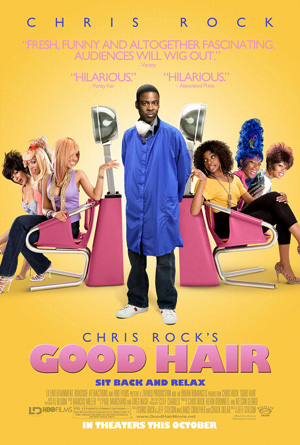 For all of the spirit Chris Rock brings to “Good Hair,†a documentary about the lengths black women in America will go to for luxurious locks, it’s absorbing and entertaining enough without him poking fun at all of the details that turn up. As a matter of fact, a few of the people who appear on camera wind up stealing the show from him: Some of them are so devoted to having great hair that they’re actually funny in spite of themselves. In that light, you’d think that he’d be in over his head, but what’s interesting about all of his wisecracks is how he uses them as emotional armor to explore a sobering truth about black culture. Come to think of it, that’s true for most of his humor.
For all of the spirit Chris Rock brings to “Good Hair,†a documentary about the lengths black women in America will go to for luxurious locks, it’s absorbing and entertaining enough without him poking fun at all of the details that turn up. As a matter of fact, a few of the people who appear on camera wind up stealing the show from him: Some of them are so devoted to having great hair that they’re actually funny in spite of themselves. In that light, you’d think that he’d be in over his head, but what’s interesting about all of his wisecracks is how he uses them as emotional armor to explore a sobering truth about black culture. Come to think of it, that’s true for most of his humor.
Enough hair-care products exist to sink a small barge, but chemical relaxers get special attention here. After all, they’re marketed squarely at black people – lots of the women (and some men) who get interviewed say they use them to manage the texture of their hair, which goes from coarse to straight in a matter of minutes. Though it’s no surprise that this stuff can be bad for you (it contains sodium hydroxide, a chemical so acidic that it can eat through aluminum), what is surprising is that most of the companies that make black hair-care products are owned by white people. When the Rev. Al Sharpton is asked to weigh in, he opines that black people are being exploited. What’s worse, he says, is that the blame rests on their shoulders.
Sharpton has the most insightful commentary here, but by no means is he the only public figure who has something to say about hair in black culture. Rock chats with a slew of celebrities ranging from the likes of Maya Angelou to Raven-Symoné, and he deals with a variety of hot topics. (How conscious are black women of their hair during sex?)
Rock’s thesis is that when it comes to having good hair, black women have to deal with an unrealistic idea of how far they should go to obtain it. Lots of them even cover it up altogether with weaves made out of hair imported from overseas, some of which can cost several thousands of dollars. We’re told that a great deal of it comes from India, whose national economy gets a significant boost from hair that gets sent to the United States. When Rock heads to India and happens upon a woman with straight hair, he gives her a little advice: “If you see some black women, just run the other way.â€
Rock gets to fool around quite a bit in this movie, but some of his subjects need no help whatsoever when it comes to making the material funny, like a bunch of eccentric hairdressers who come to Atlanta for the Hair Battle Royale at the Bronner Bros. International Hair & Beauty Show. Even though the participants go to ridiculous extremes in their quest to nail the perfect hairdo (one of them works with a woman who hangs upside down, another cuts a woman’s hair in a water tank, etc.), Rock’s good-natured enough not to judge them too harshly, or any of the other subjects who turn up here. Besides, if what he says about our culture is true, then black women are already their own worst critics.

Leave a Reply